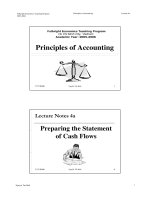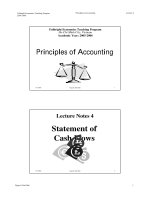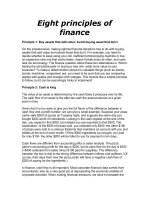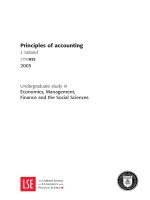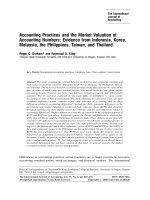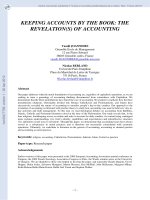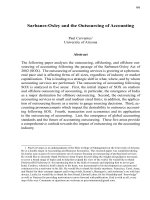Principles of Accounting
Bạn đang xem bản rút gọn của tài liệu. Xem và tải ngay bản đầy đủ của tài liệu tại đây (176.3 KB, 16 trang )
Fulbright Economics Teaching Program
2005-2006
Lecture Notes 3
Income Statement
Nguyen Bao Linh 1
Principles of Accounting
Principles of Accounting
Fulbright Economics Teaching Program
Ho Chi Minh City, Vietnam
Academic Year: 2005-2006
INCOME STATEMENT
Lecture Notes 3a
Fulbright Economics Teaching Program
2005-2006
Lecture Notes 3
Income Statement
Nguyen Bao Linh 2
Principles of Accounting
by Nguyen Bao Linh
Measuring the Business Performance
Net Income (NI) = Revenues (R) –
Expenses (E)
Revenues: the price of products,
merchandise, and services supplied by a
firm to its customers during a certain
period
Expenses: the cost of products,
merchandise, and services used by a firm
during a certain period
by Nguyen Bao Linh
Methods of Recognition
The accrual basic recognizes the impacts
of transactions on the financial
statements when revenues and expenses
occur regardless whether cash changes
hands
The cash basis only records transactions
when cash is disbursed or received
Fulbright Economics Teaching Program
2005-2006
Lecture Notes 3
Income Statement
Nguyen Bao Linh 3
Principles of Accounting
by Nguyen Bao Linh
Accounting Period
To periodically provide information to
users, the firm’s operating process is
allotted into relatively equal period,
called accounting period
The length of an accounting period may
be a month, a quarter, or a year. One-
year length is called a fiscal year
by Nguyen Bao Linh
Accounting Period
A fiscal year is not necessarily a calendar
year. The end of a fiscal year may not
coincide with the harvest in order to
– Lessen the accountant’s work at the end of
the period
– Simplify the inventory work
– Reduce the workload of allocating revenues
and expenses over various periods to account
profits accurately
Fulbright Economics Teaching Program
2005-2006
Lecture Notes 3
Income Statement
Nguyen Bao Linh 4
Principles of Accounting
by Nguyen Bao Linh
Permanent and Temporary Accounts
A temporary account is the one that will
be closed (its balance equals zero) at the
end of the accounting period to be
prepared for recording in the next
period
A permanent account is not closed at the
end of period; its ending balance
becomes the beginning one for the next
period
by Nguyen Bao Linh
Permanent and Temporary Accounts
Assets (A)
Liabilities (L)
Owners’ Equity (OE):
Capital
Withdrawals
Revenues (R)
Expenses (E)
Permanent
Accounts
Temporary
Accounts
Fulbright Economics Teaching Program
2005-2006
Lecture Notes 3
Income Statement
Nguyen Bao Linh 5
Principles of Accounting
by Nguyen Bao Linh
Matching Rule
Revenues are recognized in an accounting
period during which the firm provides
products, merchandise, and services to
customers
Expenses that are recognized in an
accounting period must been used up
during that period to generate the period
revenues
by Nguyen Bao Linh
Going-concern Rule
Firms are assumed to be continuously and
indefinitely operating unless there is
evidence on bankruptcy or stopping
business
This assumption allows accountants to
simplify their calculation and allocation of
revenues and expenses over more than
one period such as
– Deferred Revenue
– Depreciation of Fixed Assets
Fulbright Economics Teaching Program
2005-2006
Lecture Notes 3
Income Statement
Nguyen Bao Linh 6
Principles of Accounting
by Nguyen Bao Linh
Revenue Recognition
Revenues are recognized when goods and/or
services are delivered to customers regardless
whether collections have been made
To secure the matching rule, revenues are also
recorded by adjusting accounts at the end of the
accounting period
Revenue Cash
Receivables
by Nguyen Bao Linh
Expense Recognition
Expenses recognized under the matching rule must
involve in products, merchandise, or services that
have been used to generate the period revenues,
regardless whether cash changes hands
Expenses are also recorded by adjusting accounts
at the end of the accounting period
ExpenseCash
Payables


